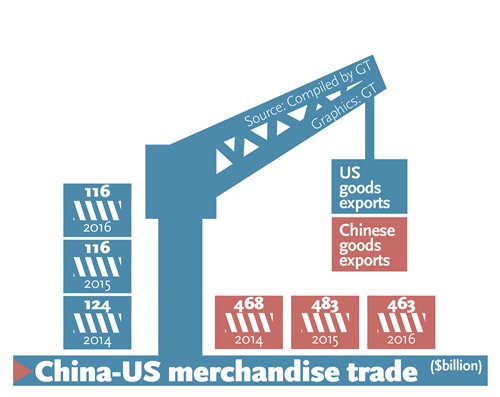
(Graphics/GT)
Competition can push domestic firms to improve: experts
China hopes to strengthen its economic and trade ties with the U.S. and plans to increase imports of energy, agricultural products, manufactured goods and services trade from the country, the Ministry of Commerce (MOFCOM) said in a report released on Thursday.
China and the U.S. are the world's two largest economies, accounting for 40 percent of the global economy and 30 percent of the world's foreign direct investment, according to MOFCOM's research report on China-U.S. economic and trade relations. Bilateral trade and economic cooperation has reached unprecedented depth and breadth, closely linking their economies.
China would like to increase imports of U.S. agricultural products such as soybeans and cotton, and speed up negotiations with the U.S. regarding traceability and inspection and quarantine of U.S. beef imports, which would benefit 6 million American farmers, according to the report.
China is also willing to discuss importing more U.S. aircraft, microchips, machine tools and other high-tech products, the MOFCOM report said.
China's total imports are expected to reach $8 trillion in the next five years, which will bring great business opportunities for U.S. companies, the ministry data showed.
"China-U.S. economic and trade relations affect the global economy... Cooperation is the right choice for the two countries," MOFCOM Spokesman Sun Jiwen said at a press conference in Beijing.
"China lags behind the U.S. in some sectors including energy, agricultural products and high-tech products, and expanding imports from the U.S. would bring some advanced technology and management experience for Chinese firms," Li Jian, a research fellow at the Chinese Academy of International Trade and Economic Cooperation, told the Global Times on Thursday.
Li said that increasing imports from the U.S. will also help boost bilateral economic and trade relations.
Xu Hongcai, deputy chief economist at the China Center for International Economic Exchanges, noted that the Sino-U.S. trade imbalance was mainly caused by the goods trade imbalance between the two countries, and that increasing services trade - an area in which the U.S. has strong advantages - will help balance bilateral trade.
China's trade surplus with the U.S. in the first quarter stood at 342.1 billion yuan ($49.8 billion), up 6.7 percent year-on-year, according to data released by the General Administration of Customs on April 13.
Xu told the Global Times on Thursday that "China was restricted by the U.S. government from importing high-tech products in previous years and China also kept its financial services sector closed to the U.S.… but these sectors are expected to be more open in the future."
The global economy is facing uncertainties and some countries disagree about the direction of the global economy's development, the ministry spokesman said, adding that China and the U.S. aim to strengthen cooperation through discussion and work to advance the global economic recovery.
"We are willing to continue to improve ties with the U.S. and promote sound, stable and sustainable bilateral economic and trade relations to benefit the people of both countries," Sun said.
Competition drive
Experts noted that expanding imports from the U.S. will bring competition pressure for Chinese companies.
"Domestic firms will be eliminated if they cannot cope with competition from foreign rivals. But this pressure could also become a kind of motivation for them to upgrade their industrial structure and transform themselves," Li said.
Xu agreed, noting that Chinese firms should ramp up efforts to enhance their competitiveness.
Sun said that China will encourage foreign enterprises to invest in China's advanced manufacturing sector and China will continue to open the market in an orderly fashion.
China is planning to ease restrictions on the equity ratios that foreign investors are permitted to hold in sectors including automotive electronics, new-energy vehicle batteries and motorcycles, according to MOFCOM.
In the past, China's restrictions on wholly foreign-owned companies in the auto industry did not help the development of the domestic carmakers, according to Xu.


















































